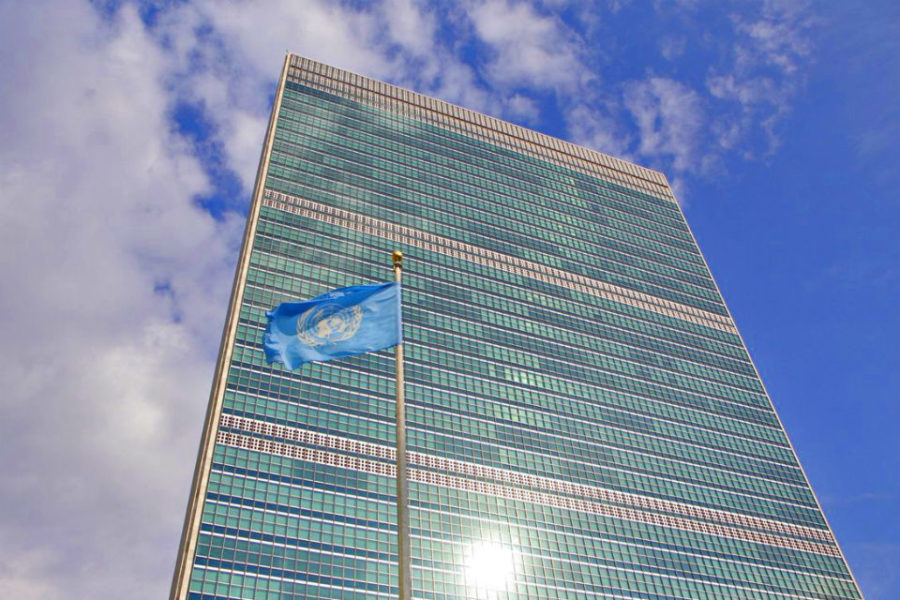19th September 2016 Geneva, Switzerland
Uniting the United Nations

Every year leaders gather in New York for the world’s only truly global summit: the ministerial week of the General Assembly of the United Nations.
UNGA week is a whirlwind of set-piece speeches, side events, motorcades, tirades, and diplomacy. Some of the great moments in international politics have taken place against the gilded backdrop of the General Assembly Hall. It is the theatre of nations, where the world’s dramas play out.
For my colleagues in the UK Mission in New York it is the culmination of weeks of preparation, as the arrival of much of the British cabinet and accompanying officials presents every kind of logistical and diplomatic challenge.
But it is also the culmination of not just weeks but months of careful preparation of another sort. For the UK, UNGA is the opportunity to rally the UN around the great issues of the day, both the most immediate, and the most far-reaching.
The UN is a highly decentralised confederation and always will be. Some of the great UN agencies such as the WHO and ILO predate the UN by decades and have their own mandates, constitutions and budgets. And yet the whole is only greater than the sum of the parts when those parts work together.
Getting all the organs of the UN to work effectively together is one of the most important responsibilities of its leadership. That is why the choice of the next UN Secretary General is so important. But it is also the responsibility of the UN’s Member States, who are represented in all these organs.
This is a responsibility the UK takes very seriously. Every year the UK works hard to put what we think are the most pressing and most important issues facing the UN system as a whole on the UNGA agenda.
This year several of those priorities are what we call “Geneva issues” – issues that are also dealt with by the UN and other agencies based in Geneva the rest of the year.
The first is the refugee and migration crisis. The great international agencies dealing with this crisis are in Geneva. These include UNHCR, the International Organisation of Migration, the ICRC, and the International Labour Organisation. The Office of the High Commissioner for Human Rights also have a role to play. Not all are UN agencies. But UNGA offers a way to join up their work, to set a strategic common direction, and to mobilise political will.
The UK missions in Geneva and New York have therefore been working in close coordination to prepare for the refugee and migration summits in New York this week. This began nearly a year ago, included the World Humanitarian Summit in May, and culminated in the preparations for this week.
Working transatlantically – UKMIS in Geneva talking to the agencies, UKMIS in New York leading on negotiations over the outcomes at UNGA – we have joined up in engaging with the global compacts on refugees and migration that will be announced in coming days.
The second area where the two UK missions have worked hand in glove, and in partnership with London, has been on Antimicrobial Resistance. The UK and Sweden began working together in Geneva on this several years ago. With a growing coalition of countries we have mobilised the World Health Organisation to take action against the growing obsolescence of antibiotics, which could claim the lives of 10 million people a year by 2050.
This year, we wanted to raise the issue to the top of the international agenda. Working with UKMIS in New York and a host of nations from across the world since last autumn, we put the issue on the agenda for this year’s UNGA. Thanks to skilful Mexican leadership, a resolution has been agreed that will see the UN this week adopt a system-wide approach to a challenge that, like climate change, requires a response measured in decades.
The third “Geneva issue” where the UK is seeking to build support for even more ambition and coherence across the UN system this year is the fight against contemporary forms of slavery. This has long been a priority of Prime Minister May, who was responsible for passing the domestic UK legislation to tackle this in 2015.
UKMIS in Geneva is currently leading a resolution at this session of the Human Rights Council to renew the three year mandate of the UN Special Rapporteur on Contemporary Forms of Slavery. This has risen even further up the agenda over the last three years because of the impact of the refugee and migration crisis, which has led to a significant increase in slavery and people trafficking.
Meanwhile, in New York this week the Prime Minister will be hosting a meeting to mobilise political will at the highest levels to do more. The UN Special Rapporteur will attend. As with the refugee and migration crisis and AMR, the objective will be more ambition, more coherence, a more effective response across the whole of the UN system.
The United Nations is only as good – and as united – as its Member States. It is also the world’s only truly global organisation, and the daunting agenda facing the planet means that it is more necessary than ever. All the leaders in New York this week have a role to play in making the UN work for all of us, and the UK will play its part.